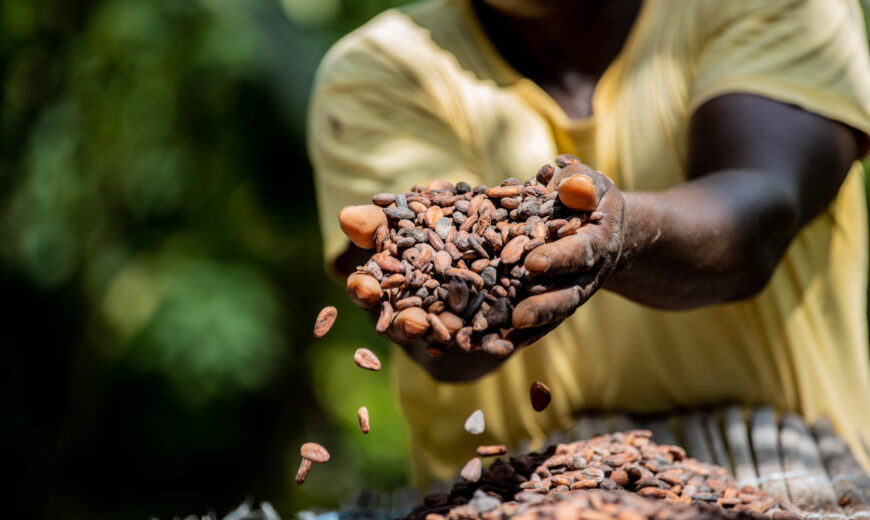12 Jul 2023
Fairtrade cocoa producers demand a greater say in achieving decent incomes

Fairtrade cocoa farmers in West Africa clearly emphasized how critical it is to be included in pivotal discussions about prices and incomes and are demanding their voices are heard and respected by cocoa traders, retailers and brands.
After a summit held in Abidjan, Côte d’Ivoire, to highlight the lack of progress on a living income for cocoa farmers in the region, co-ops issued an unprecedented joint declaration stating current earnings “are insufficient to feed our families well, live in decent housing, send our children to school or access adequate healthcare.”
"Most of the discussions on living income in cocoa take place in consuming countries,” said Benjamin Kouame Franklin, Chair of Fairtrade Africa. “With this summit we take the discussion back to Africa.”
As one farmer told the gathering: “As producers we don’t need charity, we need to be autonomous. And autonomy starts with a living income.” Others noted that the voice of producers continues to be neglected in discussions on sustainable value chains and that power imbalances mean farmers are seldom “in the driving seat of their own narrative.”
Many speakers pointed out that decisions are often made by individuals in businesses and organisations whose reality is far different from that of the people who actually grow the crops - with the result that political agendas and commercial decisions fail to take into account farmers’ priorities.
Participants were invited to debate collectively and come up with sustainable solutions. Topics under discussion included effective service delivery by cooperatives - such as coaching, subsidised inputs and compost production, labour brigades, loans, seed funding and technical assistance for diversification - all of which are vital for improving incomes.
Companies including Starbucks, Mars, Tony’s Chocolonely and Ben & Jerry’s were joined by government representatives, politicians, industry and certification bodies, and civil society organisations.
When it came to women’s empowerment, Armande Kesse, a farmer from the from ECAM cocoa co-op, spoke for many when she said, "Diversification cannot be done without women!" There was agreement that without decent incomes and higher prices, young people will continue to turn their back on farming as a viable career option. “Current farm gate prices are not high enough and will not encourage youth to commit to cocoa farming,” warned Stephen Ashia from the Ghanaian co-op ABCOFA.
The importance of committing to a living income in the framework of the proposed EU Directive on Human Rights and Environmental Due Diligence (HREDD) was also on producers’ minds. Deborah Mensah, Operations Manager at the Asunafo co-op in Ghana, called upon the EU “to check HREDD documents again and include living income” - a sentiment echoed by Matthijs van Eeuwen, Deputy Head of Mission at the Dutch Embassy in Abidjan who said: "For us a living income is a human right. The role of companies is crucial and our role to reinforce the positive dynamics is important. You can count on us.”
The summit aimed to answer the question: How can we push toward cocoa farmers earning a living income? “We know how to promote good farming practices,” said Alex Assanvo, Executive Secretary of the Côte-d’Ivoire and Ghana Cocoa Initiative during his key-note speech. “We know how to encourage farmers to work on income diversification. But how can we better pay producers? That is the elephant in the room!"
The summit declaration noted “a large majority of cocoa farmers cannot afford a decent standard of living…farmgate prices haven’t kept pace with the steep inflation of production costs and the cost of living and current farmgate prices are simply not enough to cover our costs. We call on the industry and policy-makers to shape an enabling environment that allows us to be efficient suppliers of high quality, sustainable cocoa, while earning a living income for our families.” But what should that enabling environment look like?
The declaration, agreed jointly by co-ops, the Reseau Ivoirien de Commerce Equitable (RICE) and the Association des Presidents du Coopératives de Café et Cacao (ASPCACC), calls on industry to commit to stable business partnerships, long term sourcing at sustainable prices, and shared investment risks. It also lists a number of specific recommendations aimed at multi-stakeholder sector initiatives, policy makers in consuming countries and governments in producer countries.
As a break from the intense discussions, field visits were organised to three co-ops, showcasing projects relating to agro-forestry, women’s empowerment, social housing, livelihood diversification, and preventing and remediating child labour. As the joint declaration notes, “We see it as our responsibility to implement good agricultural practices and improve the productivity, quality and resilience of our farms, producing cocoa and other crops.”